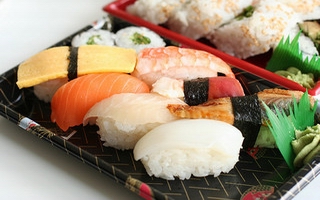 shi restaurants have been in the news of late. The popular Japanese restaurants serving up a fare of cooked vinegar rice and sashimi are a growing hotspot favorite. On the heels of a Del Rey Alexandria, Va. sushi bar banning kids, Sushi Yasuda, a high-class restaurant in New York City, has now banned something else – tipping.
shi restaurants have been in the news of late. The popular Japanese restaurants serving up a fare of cooked vinegar rice and sashimi are a growing hotspot favorite. On the heels of a Del Rey Alexandria, Va. sushi bar banning kids, Sushi Yasuda, a high-class restaurant in New York City, has now banned something else – tipping.A restaurant tip ban is quite confounding in a service-based business, and Sushi Yasuda, hailed as one of the top sushi bars in NYC, is confusing its loyal patrons with the peculiar decision.
The Manhattan-based restaurant, which can only serve 45 patrons at a time, moved to the non-tipping policy in at attempt to reflect traditional Japanese dining, a decision strictly respected in Japanese culture.
Sushi Yasuda co-founder Scott Rosenberg explains that the decision to ban tipping of his servers also makes the experience easier on the guests, who can avoid having to make calculations after they receive the bill.
“The diner doesn’t [have to] think about how much to leave and make calculations [after] a contemplative and special meal. We’re really sort of just staying connected to that classical approach [of fine Japanese dining],” Rosenberg said.
Since service-based tips customarily make up a large portion of a restaurant staff’s income, the immediate question is how a decision like this may impact the front-line servers. Rosenberg assures his group is well-compensated with a salary, including vacation days and sick leave.
The high-end restaurant with the pared-down aesthetics has slightly raised prices in order to pay its servers a competitive wage. Rosenberg wants his staff to buy into his restaurant’s message, and describes the working environment as a “family.”
“Your service staff, for those who want to pursue that as an ongoing career, they have stability, they become part of a family and that’s special. You have to be all in if you’re a salaried professional. It also attracts people who are more serious about being a part of that craft and being a part of that journey,” Rosenberg explained.
His words are certainly in line with Sushi Yasuda’s web site message, in which Rosenberg, along with co-founders Naomichi Yasuda and Shige Akimoto, indicate they “passionately believe that this remarkable food in this unique environment must be experienced and shared. [The owners] are bonded by their love of classical sushi and are devoted to maintaining the purity of their vision at all costs.”
It may take a while for the decision to gain traction, as diners in the restaurant-flooded Manhattan area are used to shelling out an additional 20 percent.
Rosenberg indicated that Sushi Yasuda’s biggest challenge was in the explanation to customers, who were a little bewildered at the idea of paying just the bottom line on the bill.
A note explaining the restaurant’s no-tipping policy is on both the menu and the printed receipt, but some customers still needed confirmation.
“They’d look up at dinner parties and say, ‘There’s no tipping?’” Rosenberg said. “There is a moment of [people saying], ‘Wait a minute, what?’ And then, ‘OK, that sounds good.’”
Rosenberg said that once customers got the hang of no-tipping and the reason behind it, they are usually on board.
“One young guy said, ‘I’m going to eat 20 percent more sushi,’” Rosenberg said.





